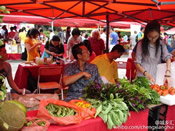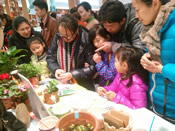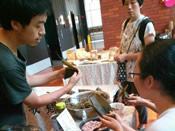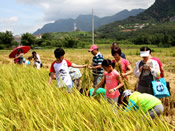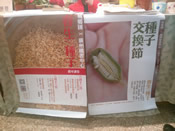
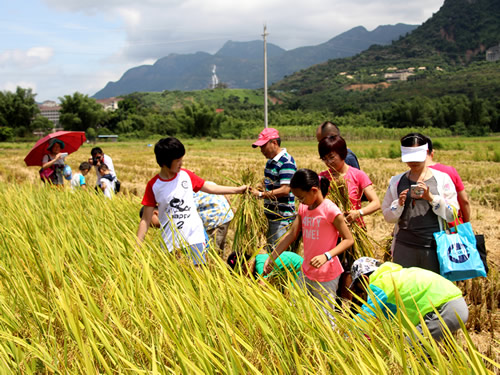 |
| Consumers, who took part in farm visits, helped harvest rice in the wet paddy fields. (Urban Rural Ensemble) |
By Rao Qihong (A founder of Urban Rural Ensemble and now an executive committee member)
|
Editor's note: "Urban Rural Ensemble" is an organic farming alliance in Guangdong Province that organises farmers’ markets in which small-scale farmers are invited to set up their stalls to sell their products. In the farmers’ market and other activities organised by Urban Rural Ensemble, producers and consumers meet face-to-face. As well as selling ecologically-grown produce, there are also fair trade products and green household items found in the market. Urban Rural Ensemble does not only want to provide urban dwellers with access to healthy food and daily necessities, but also to help poor small-scale farmers by eliminating exploitation from the many layers of intermediaries, and by giving them support and encouragement. Apart from promoting mutual help between the urban and rural population, Urban Rural Ensemble also advocates ethical consumption and raises awareness of urban dwellers on issues of public benefit. Here Rao Qihong, an executive committee member of Urban Rural Ensemble, explains how their farmers’ market is run and how consumers and other people have been brought together to build trust, mutual help and collaboration. |
On the first Saturday of every month, if you go to Zheng Ju Square in Guangzhou, you will find that in the midst of the shops in a busy commercial mall, there are a number of tables each about a metre long. On them are placed all sorts of vegetables, sauces, rice, noodles and other grains, which fill the place with its fragrance. You will also hear people asking: "What is this sauce for? Where do the ingredients of this come from?" Or: "I ordered a chicken from you but you have not kept one for me this time. Next time you must save it for me." That’s right: these are the most common scenes in the farmers' market of Urban Rural Ensemble. It is undoubtedly an indispensable part of life for urban dwellers of Guangzhou who are concerned with health and green consumption.
Operation of and interaction in the farmers' market
The Urban Rural Ensemble Farmers' Market was launched in early 2011 by five organisations that advocated ecological agriculture. The market was opened in the megacity of Guangzhou and has been running for over 5 years. Initially there were only 4 to 5 stalls. Now there are a few dozen stalls and the number of visitors is only increasing. Right from the beginning, it saw transactions and exchanges take place just like at any other market: producers and consumers exchanged and built contacts between themselves as they bought and sold food, ingredients and condiments. Consumers who wanted more information could enquire as to where the products came from and how they were produced. In this way, food helps to build a connection between the people, the land and nature. For Urban Rural Ensemble, the bustling farmers’ market is a means to build trust and connection among people and to foster meaningful interaction between producers and consumers. In the farmers' market, there is a seed exchange initiative. Urban dwellers are encouraged to bring seeds home to foster their own interests in farming. A stall is reserved for those who have grown their own vegetables to share their harvest and their experience. They can also exchange their harvest with products from other stall owners.
As well as the farmers' market, Urban Rural Ensemble also wants to attract the attention of different demographics and engage them through activities with various themes. The purpose is to promote a way of life that takes into consideration land, agriculture and environment. We have also been organising activities for various groups of people on the subject of food and agriculture. For example, university professors have been invited to talk about the development of urban and rural communities and to initiate in-depth discussion about rural reconstruction and mutual help between cities and villages. Speakers have given talks from the perspective of everyday life: telling stories from comic books on the topic of agriculture aimed for families with children, cooking locally-grown food and courses on healing techniques using natural food and herbs. Experts on environmental protection are invited to share their views on home composting and participants are taught how to make enzymes. Ecological farmers have also been invited to speak on topics on ecological farming and the support small-scale farmers need. In the last two months, an active member of the Guangzhou Urban-Rural Mutual Help Network has helped us plan a plant class, "Tranquillity Under the Tree". By teaching urban plant cultivation, promoting farming methods for edible plants, emphasising the issue of food safety - a concern of many people, advocating ecologically-friendly cultivation methods, community members are thus motivated to pay more attention not just to the issue of food and agriculture but also that of the relationship between people and the environment. To identify participants who share our philosophy and who may want to join us and work with us in promoting green and sustainable living in the community, we have intentionally used the personal interests and details of the participants as entry points in our activities.
Good and beautiful things always happen naturally outside of the classroom. We have been striving to nurture bonds among kaifong, people living in the same neighbourhood, in Guangzhou. In this way, we hope that apart from the farmers' market, consumers also have a chance to see more of the rich multitude of urban and rural sceneries.
"Xun Geng—In Search of Farming": Farm visits to foster understanding and trust
Xun Geng is another initiative from Urban Rural Ensemble that is closely connected with the farmers' market. To better regulate the process of admitting new stalls in the farmers' market, after we have received an application, we organise a visit to the farm where the products are produced, in a sense mixing business with pleasure as the professional visits are also highly enjoyable. There are two parts to the visits: activities related to the Participatory Guarantee System (PGS)[1] and activities for consumers. We have been visiting farms since 2013, and in the beginning participants went to the farms only for fun. After we learnt about PGS, we invited professional agricultural technicians, doctors specialising in nutrition and university researchers to join our visits so that we may ratify more professionally the conditions of production of the farms we visit.
Through these farm visits, consumers gain a better understanding of the conditions of production of the farms and learn more about the food and ingredients that they purchase. Urban dwellers also find delight in the hills and streams as they smell the fragrance of the earth and get close to nature. In this process, urban dwellers who started joining the farm visits only to look for safe food ended up setting up their own Xun Geng core groups and visit farms regularly on a monthly basis. They are now keen supporters of the idea of urban-rural interaction and farm producers.
Besides educational activities and farm visits, Urban Rural Ensemble has also brought together a group of volunteers who have become rather close among themselves. For example, thanks to the seed exchange initiative in the farmers' market, a group consisting of people interested in urban farming has been formed. The group members organise their own visits to each other’s rooftop vegetable gardens and exchange gardening experience. Since their purpose is to explore urban farming, they have a close connection with the "Tranquility under the Tree" initiative. Some buyers at the farmers’ market have extended their support to the market and have engaged in in-depth exchange with stall owners and farmers to aid its further development. The farmers' market has always placed an emphasis on helping small ecological farmers, so because of this, a few consumers have been actively recommending farmers to us who, although not stall owners in the farmers' market, share our philosophy. They hope that Urban Rural Ensemble can help to organise group purchase to support environment-friendly agricultural products.
An action platform for all
Through launching various kinds of activities, we wish to help consumers evolve from ecological food supporters to volunteers and organisers. We hope that citizens will one day take part in the CSA movement (note 1). This is the vision for our future development. Urban Rural Ensemble is a platform for volunteers and we have been constrained in terms of resources and manpower. We used to rely only on the few members that had to do everything. Because of this, we were very constrained on what we could do and it was difficult to develop our work. Now we see Urban Rural Ensemble as an open platform. Anyone who is concerned with urban-rural interaction can set up their own action group through this platform. In this way, people who share common visions can mobilise and organise themselves. Now there are a number of new initiatives in Guangzhou that explore diverse ways to strengthen urban-rural interaction.
Interaction, exchange, integration and thriving together lead to a good and beautiful life. Through the farmers' market, educational activities, farm visits, good products, and through exchange between supporters of the farmers' market and kaifong, Urban Rural Ensemble aims to build a harmonious urban-rural community by fostering trust, mutual support and collaboration. These are also initiatives of consumer education, an important direction that Urban Rural Ensemble has adopted in its exploration on sustainable development.
Translator: Cheung Choi-wan
English Editor: Dominique Hua
Notes:
(1) In search of alternatives to unsustainable industrialised agriculture, Community Supported Agriculture (CSA) has emerged in many countries around the world. It is a model of economy that supports small-scale farmers, fosters mutual help and collaboration between producers and consumers, and promotes environment friendly farming practices. However, CSA faces a major challenge in how to guarantee that the quality of farm products meets both green and health standards. For various reasons, mainstream certification systems either do not share the philosophy of CSA or do not meet its development needs. The global CSA movement is therefore exploring a set of quality guarantee measures under the title Participatory Guarantee System (PGS) hoping that it can contribute to the anticipated effects of CSA. An important element of PGS is to allow consumers to visit farms to learn about the ecological cultivation methods of the farmers so that they can communicate on equal terms and build trust with each other. Industry professionals are also invited on these farm visits to evaluate the production process of the farms.


